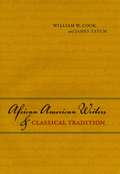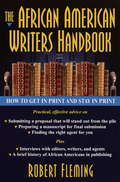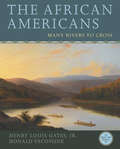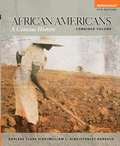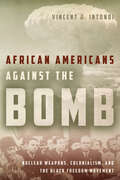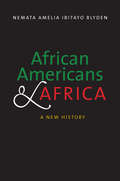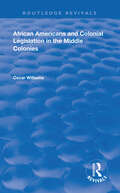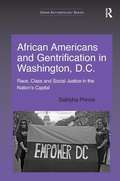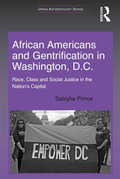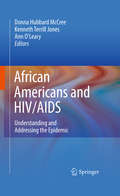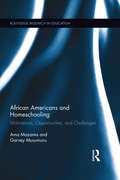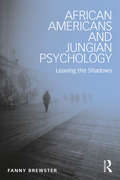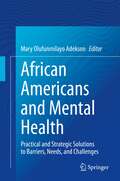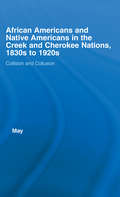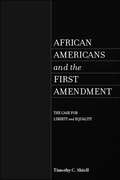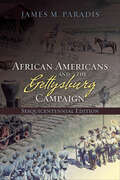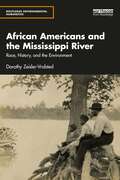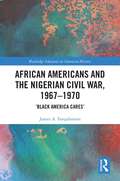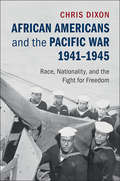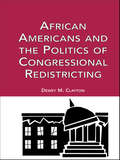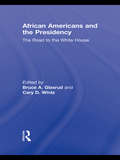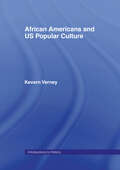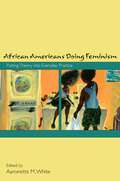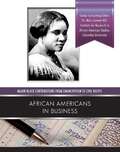- Table View
- List View
African American Writers & Classical Tradition
by William W. Cook James TatumConstraints on freedom, education, and individual dignity have always been fundamental in determining who is able to write, when, and where. Considering the singular experience of the African American writer, William W. Cook and James Tatum here argue that African American literature did not develop apart from canonical Western literary traditions but instead grew out of those literatures, even as it adapted and transformed the cultural traditions and religions of Africa and the African diaspora along the way.Tracing the interaction between African American writers and the literatures of ancient Greece and Rome, from the time of slavery and its aftermath to the civil rights era and on into the present, the authors offer a sustained and lively discussion of the life and work of Phillis Wheatley, Frederick Douglass, Ralph Ellison, and Rita Dove, among other highly acclaimed poets, novelists, and scholars. Assembling this brilliant and diverse group of African American writers at a moment when our understanding of classical literature is ripe for change, the authors paint an unforgettable portrait of our own reception of “classic” writing, especially as it was inflected by American racial politics.
The African American Writer's Handbook: How to Get in Print and Stay in Print
by Robert FlemingWith African Americans writing and buying books in record numbers, the time is ripe for a comprehensive publishing guide tailored expressly to the needs of this vibrant, creative community. The African American Writers Handbook meets this challenge perfectly. Written by veteran journalist and published author Robert Fleming, this book gives writers the heart, the determination, and above all the crucial information to publish successfully in this highly competitive field. Knowing the inner workings of the publishing industry provides any writer, novice or veteran, with a much needed advantage in the quest to get into print. Inside you'll find- A complete, step-by-step guide to every aspect of the publishing process, from the germination of a winning idea to the nuts and bolts of book production- Tips on submitting proposals, query letters, and preparing manuscripts for submission- Advice on negotiating contracts that extend careers- How to use on-line resources for research and profit- Interviews with top editors, agents, publishing executives, and bookstore owners- Updated information on copyrights, subsidiary rights, sales and marketing- The trials and triumphs of self-publishing- The art of promoting your work and yourself to a wider audience- An insider's look at the economic realities of the book business- And much more!Here, too, are scores of inspiring interviews and capsule biographies of leading African American writers both past and present. How did Richard Wright become America's first bestselling black writer? How did Zora Neale Hurston break through the artistic boundaries of the Harlem Renaissance long after her death? What was Toni Cade Bambara doing before she sold her first book? Why should Ann Petry, William Gardner Smith, Nella Larson, and William Melvin Kelley be revered wherever African American literature is read? Blending practical information and fascinating anecdotes with a mini literary history of African American writing, this upbeat, savvy, essential guide is a publishing primer with soul.
The African Americans: Many Rivers To Cross
by Henry Louis Gates Jr. Donald YacovoneThe African Americans: Many Rivers to Cross is the companion book to the six-part, six hour documentary of the same name, airing on national, primetime public television in the fall of 2013. The series is the first to air since 1968 that chronicles the full sweep of 500 years of African American history, from the origins of slavery on the African continent and the arrival of the first black conquistador, Juan Garrido, in Florida in 1513, through five centuries of remarkable historic events right up to today-when Barack Obama is serving his second term as President, yet our country remains deeply divided by race and class. The book explores these topics in even more detail than possible in the television series, and examines many other fascinating matters as well, such as the ethnic origins-and the regional and cultural diversity-of the Africans whose enslavement led to the creation of the African American people. It delves into the multiplicity of cultural institutions, political strategies, and religious and social perspectives that African Americans have created in the half a millennium since their African ancestors first arrived on these shores. Like the television series, this book guides readers on an engaging journey through the Black Atlantic world-from Africa and Europe to the Caribbean, Latin America, and the United States-to shed new light on what it has meant, and means, to be an African American. By highlighting the complex internal debates and class differences within the Black Experience in this country, readers will learn that the African American community, which black abolitionist Martin R. Delany described as a "nation within a nation," has never been a truly uniform entity, and that its members have been debating their differences of opinion and belief from their very first days in this country. The road to freedom for black people in America has not been linear; rather, much like the course of a river, it has been full of loops and eddies, slowing and occasionally reversing current. Ultimately, this book emphasizes the idea that African American history encompasses multiple continents and venues, and must be viewed through a transnational perspective to be fully understood.
African Americans: A Concise History (Combined Volume)
by Darlene Clark Hine William C. Hine Stanley C. HarroldAfrican Americans: A Concise History illuminates the central place of African-Americans in U.S. history by telling the story of what it has meant to be black in America and how African-American history is inseparably woven into the greater context of American history. It follows the long and turbulent journey of African-Americans, the rich culture they have nurtured throughout their history and the quest for freedom through which African-Americans have sought to counter oppression and racism.
African Americans Against the Bomb: Nuclear Weapons, Colonialism, and the Black Freedom Movement
by Vincent J. IntondiWell before Rev. Dr. Martin Luther King, Jr. spoke out against nuclear weapons, African Americans were protesting the Bomb. Historians have generally ignored African Americans when studying the anti-nuclear movement, yet they were some of the first citizens to protest Truman's decision to drop atomic bombs in Hiroshima and Nagasaki in 1945. Now for the first time, African Americans Against the Bomb tells the compelling story of those black activists who fought for nuclear disarmament by connecting the nuclear issue with the fight for racial equality. Intondi shows that from early on, blacks in America saw the use of atomic bombs as a racial issue, asking why such enormous resources were being spent building nuclear arms instead of being used to improve impoverished communities. Black activists' fears that race played a role in the decision to deploy atomic bombs only increased when the U.S. threatened to use nuclear weapons in Korea in the 1950s and Vietnam a decade later. For black leftists in Popular Front groups, the nuclear issue was connected to colonialism: the U.S. obtained uranium from the Belgian controlled Congo and the French tested their nuclear weapons in the Sahara. By expanding traditional research in the history of the nuclear disarmament movement to look at black liberals, clergy, artists, musicians, and civil rights leaders, Intondi reveals the links between the black freedom movement in America and issues of global peace. From Langston Hughes through Lorraine Hansberry to President Obama, African Americans Against the Bomb offers an eye-opening account of the continuous involvement of African Americans who recognized that the rise of nuclear weapons was a threat to the civil rights of all people.
African Americans and Africa: A New History
by Nemata Amelia BlydenAn introduction to the complex relationship between African Americans and the African continent What is an “African American” and how does this identity relate to the African continent? Rising immigration levels, globalization, and the United States’ first African American president have all sparked new dialogue around the question. This book provides an introduction to the relationship between African Americans and Africa from the era of slavery to the present, mapping several overlapping diasporas. The diversity of African American identities through relationships with region, ethnicity, slavery, and immigration are all examined to investigate questions fundamental to the study of African American history and culture.
African Americans and Colonial Legislation in the Middle Colonies (Studies in African American History and Culture)
by Oscar WilliamsThis study analyzes legislation governing black life in New York, New Jersey, and Pennsylvania. The years from 1664 to 1712 witnessed the formative era of slavery in the middle colonies, and by the beginning of the 18th century, specific laws governing African Americans were passed. The long range effects of the Insurrection of 1712 (which took the lives of nine whites and critically wounded five others) and the Negro Conspiracy of 1741 produced extensive slave codes in New York and New Jersey. Pennsylvania took the more subtle approach of high tariffs, starting a tariff war against slavery.Free blacks suffered under the harsh slave codes, as laws which restricted the movement of slaves also restricted the movement of free African Americans. Slaves were considered property protected by law, but free blacks were denied even this minor protection. Fear of insurrection led New York City, Albany, and Philadelphia to pass restrictive legislation. The greatest obstacle to freeing slaves was legislation requiring manumission bonds. As a result of a diversified economy, African Americans performed virtually every type of labor in the frontier communities of the middle colonies, and developed more skills than their southern counterparts. Eventually, the influx of whites provided cheap day labor that reduced dependency upon slave labor.(Ph.D. dissertation, Ohio State University, 1969; revised with new preface and foreword)
African Americans and Colonial Legislation in the Middle Colonies (Studies In African American History And Culture Ser.)
by Oscar WilliamsFirst published in 1998. During the first quarter of the seventeenth century Blacks began arriving in the middle colonies region. At first, regulation of these individuals posed no problem, but by the beginning of the eighteenth century it became increasingly obvious that specific laws governing Blacks needed to be legislated in detail. New York took the lead by having more slaves and legislation than New Jersey and Pennsylvania. This study is primarily an effort to analyze and compare legislation governing Blacks in the middle colonies.
African Americans and Gentrification in Washington, D.C.
by Sabiyha PrinceUsing qualitative data, including extensive interview material and ethnographic research, to explore the experiences and ideas of African Americans as they confront and construct gentrification, this book contextualizes black Washingtonians' perspectives on belonging and attachment during a marked period of urban restructuring and demographic change in the nation's capital.
African Americans and Gentrification in Washington, D.C.: Race, Class and Social Justice in the Nation’s Capital (Urban Anthropology)
by Sabiyha PrinceThis book uses qualitative data to explore the experiences and ideas of African Americans confronting and constructing gentrification in Washington, D.C. It contextualizes Black Washingtonians’ perspectives on belonging and attachment during a marked period of urban restructuring and demographic change in the Nation’s Capital and sheds light on the process of social hierarchies and standpoints unfolding over time. African Americans and Gentrification in Washington, D.C. emerges as a portrait of a heterogeneous African American population wherein members define their identity and culture as a people informed by the impact of injustice on the urban landscape. It presents oral history and ethnographic data on current and former African American residents of D.C. and combines these findings with analyses from institutional, statistical, and scholarly reports on wealth inequality, shortages in affordable housing, and rates of unemployment. Prince contends that gentrification seizes upon and fosters uneven development, vulnerability and alienation and contributes to classed and racialized tensions in affected communities in a book that will interest social scientists working in the fields of critical urban studies and urban ethnography. African Americans and Gentrification in Washington, D.C. will also invigorate discussions of neoliberalism, critical whiteness studies and race relations in the 21st Century.
African Americans and HIV/AIDS: Understanding and Addressing the Epidemic
by Ann O'Leary MPH Msw Kenneth Terrill Jones Donna Hubbard Mccree RphThe HIV/AIDS epidemic is burgeoning among African American men and women. Despite comprising only 13% of the population, 50% of new HIV diagnoses in 2004 were among African Americans. Among women and men who have sex with men (MSM), African Americans are grossly disproportionately affected by this epidemic, and this trend shows no sign of abating. This book seeks to explore some of the contextual factors that contribute to this disparity as well as ways to intervene to slow the growth of the epidemic in the U.S. This volume will focus on the history and context of HIV/AIDS in African Americans and interventions targeting specific sub-populations including adolescents, heterosexual men and women, men who have sex with men, incarcerated populations, and injection drug users. Context chapters will focus on specific contextual and structural issues related to HIV/AIDS transmission and prevention in African Americans including disparities in incarceration, racism, economic issues and substance abuse. Intervention chapters will focus on best-evidence and promising-evidence based interventions targeting HIV prevention in African Americans. These chapters will address the latest in intervention strategies, program evaluation, cost effectiveness and qualitative research methods and will include risk reduction, risk assessment, and testing and counseling.
African Americans and Homeschooling: Motivations, Opportunities and Challenges (Routledge Research in Education #125)
by Ama Mazama Garvey MusumunuDespite greater access to formal education, both disadvantaged and middle-class black students continue to struggle academically, causing a growing number of black parents to turn to homeschooling. This book is an in-depth exploration of the motivations behind black parents’ decision to educate their children at home and the strategies they’ve developed to overcome potential obstacles. Citing current issues such as culture, religion and safety, the book challenges the commonly expressed view that black parents and their children have divested from formal education by embracing homeschooling as a constructive strategy to provide black children with a valuable educational experience.
African Americans and Jungian Psychology: Leaving the Shadows
by Fanny BrewsterAfrican Americans and Jungian Psychology: Leaving the Shadows explores the little-known racial relationship between the African diaspora and C.G. Jung’s analytical psychology. In this unique book, Fanny Brewster explores the culture of Jungian psychology in America and its often-difficult relationship with race and racism. Beginning with an examination of how Jungian psychology initially failed to engage African Americans, and continuing to the modern use of the Shadow in language and imagery, Brewster creates space for a much broader discussion regarding race and racism in America. Using Jung’s own words, Brewster establishes a timeline of Jungian perspectives on African Americans from the past to the present. She explores the European roots of analytical psychology and its racial biases, as well as the impact this has on contemporary society. The book also expands our understanding of the negative impact of racism in American psychology, beginning a dialogue and proposing how we might change our thinking and behaviors to create a twenty-first-century Jungian psychology that recognizes an American multicultural psyche and a positive African American culture.African Americans and Jungian Psychology: Leaving the Shadows explores the positive contributions of African culture to Jung’s theories and will be essential reading for analytical psychologists, academics and students of Jungian and post-Jungian studies, African American studies, and American studies.
African Americans and Mental Health: Practical and Strategic Solutions to Barriers, Needs, and Challenges
by Mary Olufunmilayo AdeksonThis book enumerates the unique challenges, barriers, needs, and trauma of being an African American in the United States, and at the same time highlights what needs to be done to improve and foster the mental health healing of this population. This includes practical applications and strategic solutions that work, such as the family togetherness and ardent spiritual beliefs that form the basis for resilient and vibrant mental health among African Americans. This contributed volume features the authorship of counseling professionals, most of whom are African American themselves. Because of their own personal experiences, they are able to emphasize cogent helping strategies for this population, to show how to move forward with encouragement. The book also highlights ways to promote life that is mentally healthy and holistic for African Americans.Topics covered within the chapters include:Mental Health Challenges Unique to African American Children and AdolescentsDiagnosis Issues with African Americans Culture of Family Togetherness, Emotional Resilience, and Spiritual Lifestyles Inherent in African Americans from the Time of Slavery Until Now The Trauma of Being an African American in the 21st Century Training, Recruiting, and Retaining African American Mental Health ProfessionalsAfrican Americans and Mental Health: Practical and Strategic Solutions to Barriers, Needs, and Challenges is an essential resource for helping professionals who work with this population, including psychiatrists, counselors, psychologists, social workers, and other mental health professionals. The book also should be of interest to researchers, instructors, and students in Counseling, Social Work, and Psychology.
African Americans and Native Americans in the Cherokee and Creek Nations, 1830s-1920s: Collision and Collusion (Studies in African American History and Culture)
by Katja MayFirst published in 1996. Routledge is an imprint of Taylor & Francis, an informa company.
African Americans and the First Amendment: The Case for Liberty and Equality (SUNY series in African American Studies)
by Timothy C. Shiell2020 CHOICE Outstanding Academic TitleAfrican Americans and the First Amendment is the first book to explore in detail the relationship between African Americans and our "first freedoms," especially freedom of speech. Timothy C. Shiell utilizes an interdisciplinary approach to demonstrate that a strong commitment to civil liberty and to racial equality are mutually supportive, as they share an opposition to orthodoxy and a commitment to greater inclusion and participation. This crucial connection is evidenced throughout US history, from the days of colonial and antebellum slavery to Jim Crow: in the landmark US Supreme Court decision in 1937 freeing the black communist Angelo Herndon; in the struggles and victories of the civil rights movement, from the late 1930s to the late '60s; and in the historical and modern debates over hate speech restrictions. Liberty and equality can conflict in individual cases, Shiell argues, but there is no fundamental conflict between them. Robust First Amendment values protect and encourage demands for racial equality while weak First Amendment values, in contrast, lead to censorship and a chilling of demands for racial equality.
African Americans and the Gettysburg Campaign
by James M ParadisThe Sesquicentennial edition of African Americans and the Gettysburg Campaign updates the original 2006 edition, as James M. Paradis introduces readers to the African-American role in this famous Civil War battle. In addition to documenting their contribution to the war effort, it explores the members of the black community in and around the town of Gettysburg and the Underground Railroad activity in the area.
African Americans and the Mississippi River: Race, History, and the Environment (Routledge Environmental Humanities)
by Dorothy Zeisler-VralstedThis book follows the historical trajectory of African Americans and their relationship with the Mississippi River dating back to the 1700s and ending with Hurricane Katrina and the still-contested Delta landscape. Long touted in literary and historical works, the Mississippi River remains an iconic presence in the American landscape. Whether referred to as "Old Man River" or the "Big Muddy," the Mississippi River represents imageries ranging from the pastoral and Acadian to turbulent and unpredictable. However, these imageries—revealed through the cultural production of artists, writers, poets, musicians, and even filmmakers—did not reflect the experiences of everyone living and working along the river. Missing is a broader discourse of the African American community and the Mississippi River. Through the experiences of African Americans with the Mississippi River, which included narratives of labor (free and enslaved), refuge, floods, and migration, a different history of the river and its environs emerges. The book brings multiple perspectives together to explore this rich history of the Mississippi River through the intersection of race and class with the environment. The text will be of great interest to students and researchers in environmental humanities, including environmental justice studies, ethnic studies, and US and African American history.
African Americans and the Nigerian Civil War, 1967–1970: ‘Black America Cares’ (ISSN)
by James A. FarquharsonThis book is the first to recover and analyse at length the extent, complexity, and character of African American responses to the Nigerian Civil War (1967–1970).Far from having only marginal significance, the Nigerian Civil War collided at full velocity with the conflicting discourses and ideas by which black Americans sought to understand their place in the United States and the world in the late 1960s. Black civil rights leaders offered their service as agents of direct diplomacy during the conflict, seeking to preserve Nigerian unity; grassroots activists organised food-drives, concerts, and awareness campaigns in support of humanitarian aid for victims of famine in the warzone; while other black activists warned of an imminent genocide and called for an united response from black Americans. Drawing on private papers, activist literature, government records, and especially the black press, it charts the way the civil war shaped, as well as challenged, the worldview of African Americans regarding black internationalist solidarities, territorial sovereignty and political viability, humanitarian compassion, and the political trajectory of postcolonial Africa.With a chronological approach, this study is the ideal resource for all those interested in the Nigerian Civil War and the history of black internationalism.
African Americans and the Pacific War, 1941–1945: Race, Nationality, and the Fight for Freedom
by Chris DixonIn the patriotic aftermath of Pearl Harbor, African Americans demanded the right to play their part in the war against Japan. As they soon learned, however, the freedom for which the United States and its allies was fighting did not extend to African Americans. Focusing on African Americans' experiences across the Asia-Pacific theater during World War Two, this book examines the interplay between national identity, the racially segregated US military culture, and the possibilities of transnational racial advancement, as African Americans contemplated not just their own oppression but that of the colonized peoples of the Pacific region. In illuminating neglected aspects of African American history and of World War Two, this book deepens our understanding of the connections between the United States' role as an international power and the racial ideologies and practices that characterized American life during the mid-twentieth century.
African Americans and the Politics of Congressional Redistricting (Race and Politics #Vol. 2)
by Dewey M. ClaytonThis book provides a detailed analysis of the politics of racial redistricting, a topic of particular concern in light of recent federal court cases. The book is divided into two parts. Part one examines the historical exclusion of blacks from the American political process and the politics behind congressional redistricting. The text focuses on partisan manoeuvering and assesses whose interests were being served. In particular, the book chronicles the legislative action (creation of majority black districts) in North Carolina and around the South. Part two shifts the focus to the myriad of legal battles that ensued as a result of the newly-created districts in North Carolina and around the South. Majority black districts have been dismantled in the Supreme Court. This has been due to the criticism of their "arbitrary" shape, and the notion that race was considered a predominant fact or in their design. Yet, irregularly-shaped majority white districts have not been accused of violating districting principles. This book purports that blacks were not elected to national office in large numbers prior to the creation of majority black districts, indicating the continuing need for race-conscious districting as a temporary solution to a complex problem.
African Americans and the Presidency: The Road to the White House
by Bruce A. Glasrud Cary D. WintzAfrican Americans and the Presidency explores the long history of African American candidates for President and Vice President, examining the impact of each candidate on the American public, as well as the contribution they all made toward advancing racial equality in America. Each chapter takes the story one step further in time, through original essays written by top experts, giving depth to these inspiring candidates, some of whom are familiar to everyone, and some whose stories may be new. Presented with illustrations and a detailed timeline, African Americans and the Presidency provides anyone interested in African American history and politics with a unique perspective on the path carved by the predecessors of Barack Obama, and the meaning their efforts had for the United States.
African Americans and US Popular Culture
by Kevern VerneyThis volume is an authoritative introduction to the history of African Americans in US popular culture, examining its development from the early nineteenth century to the present. Kevern Verney examines: * the role and significance of race in all major forms of popular culture, including sport, film, television, radio and music* how the entertainment industry has encouraged racism through misrepresentations and caricatured images of African Americans. African Americans have made a unique contribution to the richness and diversity of US popular culture. Rooted in African society and traditions, black slaves in America created a dynamic culture which continues to evolve. Present day hip-hop and rap music are still shaped by the historical experience of slavery and the ongoing will to oppose oppression and racism. Any student of African-American history or cultural studies will find this a fascinating and highly useful book.
African Americans Doing Feminism: Putting Theory into Everyday Practice
by Aaronette M. WhiteHow might ordinary people apply feminist principles to everyday situations? How do feminist ideas affect the daily behaviors and decisions of those who seek to live out the basic idea that women are as fully human as men? This collection of essays uses concrete examples to illuminate the ways in which African Americans practice feminism on a day-to-day basis. Demonstrating real-life situations of feminism in action, each essay tackles an issue—such as personal finances, parenting, sexual harassment, reproductive freedom, incest, depression and addiction, or romantic relationships—and articulates a feminist approach to engaging with the problem or concern. Contributors include African American scholars, artists, activists, and business professionals who offer personal accunts of how they encountered feminist ideas and are using them now as a guide to living. The essays included reveal how feminist principles affect people's perceptions of their ability to change themselves and society, because the personal is not always self-evidently political.
African Americans in Business (Major Black Contributions from Emancipat)
by Tish DavidsonMany people dream of owning their own business or making it to the top of the corporate ladder. In the pages of this book, you'll meet African Americans who overcame obstacles and stereotypes to make their dreams a reality. Madam C. J. Walker was orphaned at age 7, married at 14, became a mother at 18, and was widowed at 20. She went on make a million dollars selling hair care products. Berry Gordy loved music but went broke after opening a record store. He didn't give up, though. Gordy eventually started Motown Records, which became one of the country's most successful record labels and introduced a host of talented black artists to mainstream American audiences. Stanley O'Neal grew up on a farm without running water or indoor toilets. Through intelligence and hard work he became the head of a $50 billion investment bank. Read about these and other inspiring figures in this book.
